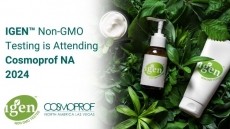Haut.AI’s 'Skin Atlas' secures patent: A breakthrough in privacy-preserving skin analysis

Haut.AI, a leader in AI-driven skin care solutions, has announced the successful patent of its latest technology, "Skin Atlas." The innovation seeks to resolve a significant gap in the digital skin analysis landscape by addressing a growing concern in the personal care industry—data privacy.
In an interview with CosmeticsDesign, Anastasia Georgievskaya, founder of Haut.AI, discussed the inspiration and technological breakthroughs that led to the creation of what she describes as a first-of-its-kind skin analysis tool, which could have profound implications for cosmetics and personal care manufacturers.
Tackling the challenges of AI skin analysis
The development of "Skin Atlas" stemmed from Haut.AI’s ongoing work in improving AI skin analysis technology. As Georgievskaya explained, “We realized that processing original, identifiable images wasn’t optimal—selfies often contain irrelevant elements like hair or backgrounds, which not only slow down the process but also introduce unnecessary information into the analysis.”
The introduction of "Skin Atlas" solves this issue by focusing exclusively on the skin. "By anonymizing images, we were able to optimize the analysis process, making it faster and more accurate," Georgievskaya said, highlighting how the technology offers complete anonymization before analysis begins.
For an industry increasingly reliant on AI to deliver personalized skin assessments, Haut.AI's innovation represents a significant leap forward. The privacy-preserving system eliminates personal identifiers like eyes, hair, or background details, allowing AI algorithms to work without distortion or error.
A patent for true innovation
While image anonymization is not entirely new, "Skin Atlas" is the first to apply this concept specifically to AI-driven skin analysis. Traditional anonymization techniques, such as covering eyes with black rectangles, have proven inadequate in AI applications due to the artifacts they introduce.
According to Georgievskaya, “Algorithms produce a lot of errors when exposed to the type of data that was anonymized in such an abrupt way.”
"Skin Atlas," however, leverages generative AI to fill in gaps left by anonymization with photorealistic skin patterns, allowing the neural networks to function as intended. “The anonymized image doesn’t have harsh edges, and this format allows the algorithm to work error-free,” she explained.
This improvement ensures that privacy does not come at the expense of diagnostic accuracy—a crucial balance in the beauty and skin care industries.
Enhancing accuracy with generative AI
An integral component of "Skin Atlas" is its ability to create highly detailed, photorealistic skin patterns using generative AI. The technology behind this process, dubbed "SkinGPT," plays a pivotal role in enhancing the accuracy of skin diagnostics.
"SkinGPT can generate synthetic skin patterns from noise, allowing us to model various skin conditions in a controlled way," Georgievskaya explained. This innovation helps to maintain the quality of the analysis, even after the anonymization process has taken place.
By focusing solely on skin pixels and removing irrelevant details, "Skin Atlas" minimizes biases and ensures more reliable outcomes across varying skin tones, textures, and lighting conditions—a crucial factor in ensuring fairness and accuracy across diverse user groups.
Addressing consumer privacy concerns
As privacy concerns grow and regulations tighten, the beauty and skin care industries face increasing pressure to protect personal data. "Skin Atlas" aims to alleviate these concerns by ensuring that no personal identifiers are processed.
“The anonymization happens on the device itself, meaning the original photo never leaves the user's phone,” Georgievskaya pointed out, reassuring that only anonymized images are sent for analysis.
For manufacturers and e-commerce platforms, this is a potential game-changer. With consumers becoming more privacy-conscious, technologies like "Skin Atlas" help build trust.
“Consumers want to enjoy services like digital skin analysis without compromising their privacy," said Georgievskaya. For e-commerce and clinical skin analysis platforms, this means increased adoption and higher-quality data, enabling more personalized and effective skin care recommendations.
Transforming the future of skin analysis
The implications of "Skin Atlas" extend beyond privacy. As adoption grows, Georgievskaya sees the technology becoming a cornerstone for hyper-personalized beauty experiences. "As trust and adoption increase, the quality of personalized beauty experiences improves," she said, envisioning stronger consumer relationships and more effective skin care solutions as a result.
Moreover, with plans to make the technology available directly on consumer devices, Haut.AI is poised to further reduce barriers for brands and clinics looking to integrate advanced AI-driven tools into their systems. By the first quarter of next year, users will be able to access "Skin Atlas" from their smartphones or tablets, without the need for cloud processing.
A win-win for manufacturers and consumers
For cosmetics and personal care product manufacturers, "Skin Atlas" offers a clear path forward in the evolving AI-driven landscape. The technology ensures compliance with data privacy regulations while enabling brands to innovate and improve their products. By providing a privacy-preserving solution, manufacturers can gain better insights into consumer skin conditions without the complexity of managing personal data.
In collaboration with major industry players such as Ulta Beauty and Beiersdorf, Haut.AI is already laying the groundwork for broader adoption of "Skin Atlas." Georgievskaya anticipates that these partners will be able to integrate the technology seamlessly into their existing systems, enhancing their capabilities to offer trusted, personalized skin care solutions.
"Growing privacy concerns are limiting access to personal data, which could slow down innovation," Georgievskaya concluded. However, with "Skin Atlas," Haut.AI has demonstrated that it's possible to push the boundaries of technology without compromising consumer trust or regulatory compliance—a promising vision for the future of AI in skin care.
















